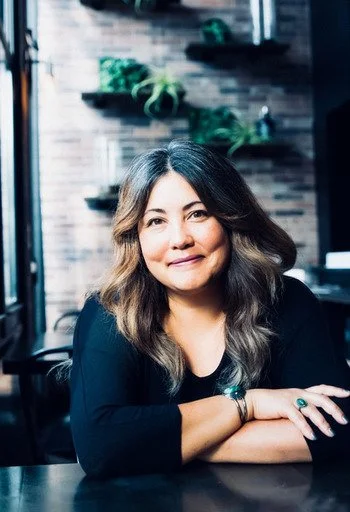Episode 41: The Sacred Work of Belonging
An interview with Tasha Jun
Tasha shares her in-process story of the sacred work of belonging she’s doing as a biracial woman in America & gives us a glimpse into her newly released memoir, “Tell Me The Dream Again.”
The Seeds
Name: Tasha Jun
Age: 44
Where do you call home: Indiana (and the world)
Relationship Status: Married
Season of Work: Mothering & Writing
Hobbies: Reading, Travel, Writing, and Mentoring
Jesus Journey: I didn’t grow up going to church but did hear bits and pieces about Jesus throughout my childhood with various stints of involvement in a church or faith community. It was like a lot of puzzle pieces that finally started to come together for me in late high school and college. My parents, my grandparents, friends, an Asian American summer camp, and a high school youth group planted seeds
The Branches
Tasha, we all have this innate desire to belong. To be part of something. To be seen, known, and loved. We have science that tells us the importance of parents/caregivers developing a secure attachment with their babies and how if that’s absent there may be issues with bonding, belonging, and relationships in later years. With this science in mind, what is your definition of belonging? Why do you see ‘belonging’ as sacred work?
Belonging is resting securely in my belovedness and allowing that belovedness to tether me to others and their belovedness.
So many of us experience the ache of belonging and feel the ever-present struggle to grasp belonging or search for it. Part of what I think has been healing, sacred work for me is facing my story and unique make-up honestly and working to embrace those parts so that I may experience them as intentionally given, perfectly loved parts of me. This work has looked like passing stories on to others, to my children, and rebuilding pieces that have been lost - like traditions language, or history.
This ministry is filled with the beautiful tapestry of God’s daughters from different backgrounds, ages, and stages who desire to seek the Lord, build a sisterhood share stories of God’s goodness and faithfulness, and tell their stories with their voices. Tasha, when we try to fit everyone into the same “belonging box” and don’t honor the beautiful uniqueness of people in places and spaces what do we miss out on?
I think we miss out on the details of a person - like taking whole chapters out of the middle of a book. We don’t get a full picture and ultimately, we miss out on the unique reflection of God in that person/story.
As it relates to the “C”hurch what’s at stake if we have a “color-blind” theology?
We are literally trying to erase and pretend not to see parts of the imago Dei that are unfamiliar or uncomfortable to us. We cannot grow in intimacy with others or with God if we refuse to see all of them/God. There’s no personal relationship there.
Why should we as Christians denounce and not play into cultural assimilation? What is lost? What can be gained by honoring, seeing, and celebrating the uniqueness of the entire Imago Dei?
Deeper intimacy and true community and unity are what we risk losing when we assimilate or ask others to. And on the flip side, we have a chance at transformative community, intimacy, and unity when we denounce these things.
The phrase “caught between two worlds” resonates deeply for many Multi-Ethnic people in America. What has “caught between two worlds” looked like for you?
I never felt like I fully fit into Asian American spaces that didn’t have room for mixed-race Asians. I didn’t feel at home in the majority white spaces, and when I was in Korean American spaces or when I traveled to Korea, I felt at home and completely foreign. There were real experiences that contributed to this - not just abstract feelings, too.
You’ve written often about the idea of being “Shalomsick.” What does that mean?
Shalom is a Hebrew greeting meaning “peace to you,” but this peace is more than a lack of conflict or chaos, it’s a deep peace and wholeness that involves our entire being and more.
I’ve always felt homesick for another place - as far back as I can remember. I can’t remember not knowing an ache or feeling close to an ache - even as a small girl. Looking back I see it’s more than an ache for one place or people. Being biracial and having had homes in 3 different countries and continents has only made me even more homesick and aware that there’s not a single place that can smooth the edges of that ache. It’s more than a place or people - it’s wholeness for myself, those I love, and the world. An ache for shalom for all of us.
How has writing been a pathway to lead you towards the hope of shalom?
Writing has kept me connected to all that’s honest and true in me. It’s been a path on paper for my feelings and hopes and deep hurts to walk onto and wander and be found.
Speaking of writing…you wrote your 1st book titled, “Tell Me the Dream Again: Reflections on Family, Ethnicity, and the Sacred Work of Belonging. What inspired the title and how did you know it was time to share these words with the world?
The title comes from dialogue between my mom and me. It’s me asking her to tell me the recurring tiger dream she had when I was younger.
Tasha, what is your hope and prayer for the readers of this book?
In sharing my stories, I hope it opens new worlds and glimpses of how deep and wide God’s love, creativity, and reflection are. While reading my specifics, I hope readers will be brought to their own stories - the hidden places & spaces that they think aren’t welcome. The places of loneliness and pain - to the perfect, mending love of God.
For the Olive Us sister who is Multi-Ethnic, living in America, and struggling to embrace her story and find belonging in the church, what encouragement would you give her?
Tell God about the places, foods, and people that feel most like home to you. Unfiltered. Go to God and pour your heart out like water. Don’t worry about tidying up, or making yourself sound a certain way. Practice seeing yourself whole in intimacy with God. Let God meet you there. Get to know your voice. Surrender to the beautiful way you were made, not the ways you’ve thought you need to make yourself beautiful or powerful or whatever else. Receive who you are. Good, good things will come from that.
For the Olive Us sister who wants to learn how to be a better listener and is part of spaces and places where only one voice & one way of being is preferred, carried out, and embodied…what encouragement and steps forward would you offer up?
Ask “What’s missing?” A lot. Let that be a question you ask over and over. That’s something I carry around a lot. Also ask, “How can I move toward that missing piece?” I really believe that God will answer when we ask honestly. There will be something. It doesn’t have to be huge. We are not trying to solve everything ourselves. There’s probably one way, one person, that you can make better.
Olive Us was created for women to share their in-process stories and be reminded they’re connected through Christ and not alone. Why is this important?
When we are alone, we are prone to give up. We are made to move through life together - connected.
The Olive Tree
Finish these statements:
God is…love.
Belonging is sacred work because…it’s living out of God’s love and offering it to the world around us.
Accepting who we are & where we come from is…sacred, holy work.
‘Olive Us’ are better when…we see ourselves and one another.
Olives to Go
Favorite Worship Song:

